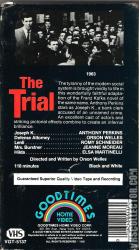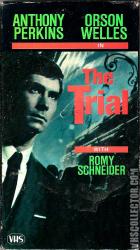The Trial
Catalog Number
VGT-5137
-
Primary Distributor (If not listed, select "OTHER")
Catalog Number
VGT-5137
Primary Distributor (If not listed, select "OTHER")
Release Year
Country
N/A (NTSC)
N/A | N/A | N/A
N/A | N/A
The Trial (1963)
Additional Information
Additional Information
Much of Orson Welles' latter-day reputation as an "unfathomable" genius rests upon his seeming unwillingness to tell a story in clear, precise fashion. Sometimes, as in such films as Touch of Evil, Welles' spotty storytelling skills can be forgiven in the light of the excellent visuals. In other cases, as in his 1962 adaptation of Kafka's The Trial, Welles'style comes across as empty virtuosity, precious and petulant when it should be profound. Anthony Perkins plays Joseph K, a man condemned for an unnamed crime in an unnamed country. Seeking justice, Joseph K is sucked into a labyrinth of bureaucracy (Welles once described the character as being a "little bureaucrat" himself, who deserves to be punished. This is never clearly expressed in the finished film). Along the way, he becomes involved with three women -- Jeanne Moreau, Romy Schneider, Elsa Martinelli -- who in their own individual ways are functions of the System that persecutes him. While Welles considered The Trial one of his finest films, this enthusiasm is not universally shared; even his most fervent admirers have been known to emerge from a screening of the film with quizzical, disappointed expressions on their faces. On the plus side, Welles and his cinematographer Edmond Richard perform miracles in transforming an abandoned French railway station into the headquarters of a totalitarian, red tape-ridden society. It's also fun to hear Welles' voice emanating from several of the supporting characters (his post-dubbing budget was nil). All in all, however, The Trial never truly works; it is unfair, however, to lay the blame for this entirely on Welles, inasmuch as the 1948 and 1994 attempts to cinematize the original Kafka novel likewise came a cropper.
he Trial is a 1962 film directed by Orson Welles, who also wrote the screenplay based on the novel of the same name by Franz Kafka. Welles stated immediately after completing the film: "The Trial is the best film I have ever made."[1] The film begins with Welles narrating Kafka's parable "Before the Law" to pinscreen scenes created by the artist Alexandre Alexeieff. Anthony Perkins stars as Josef K., a bureaucrat who is accused of a never-specified crime, and Jeanne Moreau, Romy Schneider, and Elsa Martinelli play women who become involved in various ways in Josef's trial and life. Welles plays the Advocate, Josef's lawyer and the film's principal antagonist. The Trial was filmed in Europe and has been praised for its creative set designs and cinematography, especially Welles's uses of unique angles and focus.[2]
Welles initially planned to premiere The Trial at the Venice Film Festival in September 1962, but the film was not completed in time. The festival organizers showed the Academy Award winning musical West Side Story instead.[10]
Welles continued to edit the film up until its December 1962 premiere in Paris. In an interview with the BBC, he mentioned that on the eve of the premiere he jettisoned a ten-minute sequence (it is actually about six minutes long) where Josef K. meets with a computer scientist (played by Greek actress Katina Paxinou) who uses her technology to predict his fate. Welles explained the last-minute cut by noting: "I only saw the film as a whole once. We were still in the process of doing the mixing, and then the premiere fell on us... It should have been the best in the film and it wasn't. Something went wrong, I don't know why, but it didn't succeed."[8]
The Trial opened theatrically in the U.S. in 1963. Over the years, the film has polarized critics and Welles’ scholars and biographers. For example, Charles Higham’s 1970 biography on Welles dismissed the film as "an agonizing experience ... a dead thing, like some tablet found among the dust of forgotten men." But in his 1996 biography on Welles, David Thomson said the film was "an astonishing work, and a revelation of the man ... a stunning film."[11]
The film won the "Best Film" award of the French Syndicate of Cinema Critics in 1964.
Despite continued criticism of the film (mentioned above), a more contemporary analysis alludes to the film's lasting effect and hints at the genius within the film as created by Welles. Immediately after its completion, Welles said, "Say what you like, but 'The Trial' (is) the best film I ever made."[12] Today, the film enjoys enthused reviews on Rotten Tomatoes, with 88% of critics awarding the film a positive review. Prolific film critic, Roger Ebert, called the film "an exuberant use of camera placement and movement and inventive lighting," awarding it four out of a possible four stars.[13]
Release Date: February 20, 1963 by Astor Pictures
he Trial is a 1962 film directed by Orson Welles, who also wrote the screenplay based on the novel of the same name by Franz Kafka. Welles stated immediately after completing the film: "The Trial is the best film I have ever made."[1] The film begins with Welles narrating Kafka's parable "Before the Law" to pinscreen scenes created by the artist Alexandre Alexeieff. Anthony Perkins stars as Josef K., a bureaucrat who is accused of a never-specified crime, and Jeanne Moreau, Romy Schneider, and Elsa Martinelli play women who become involved in various ways in Josef's trial and life. Welles plays the Advocate, Josef's lawyer and the film's principal antagonist. The Trial was filmed in Europe and has been praised for its creative set designs and cinematography, especially Welles's uses of unique angles and focus.[2]
Welles initially planned to premiere The Trial at the Venice Film Festival in September 1962, but the film was not completed in time. The festival organizers showed the Academy Award winning musical West Side Story instead.[10]
Welles continued to edit the film up until its December 1962 premiere in Paris. In an interview with the BBC, he mentioned that on the eve of the premiere he jettisoned a ten-minute sequence (it is actually about six minutes long) where Josef K. meets with a computer scientist (played by Greek actress Katina Paxinou) who uses her technology to predict his fate. Welles explained the last-minute cut by noting: "I only saw the film as a whole once. We were still in the process of doing the mixing, and then the premiere fell on us... It should have been the best in the film and it wasn't. Something went wrong, I don't know why, but it didn't succeed."[8]
The Trial opened theatrically in the U.S. in 1963. Over the years, the film has polarized critics and Welles’ scholars and biographers. For example, Charles Higham’s 1970 biography on Welles dismissed the film as "an agonizing experience ... a dead thing, like some tablet found among the dust of forgotten men." But in his 1996 biography on Welles, David Thomson said the film was "an astonishing work, and a revelation of the man ... a stunning film."[11]
The film won the "Best Film" award of the French Syndicate of Cinema Critics in 1964.
Despite continued criticism of the film (mentioned above), a more contemporary analysis alludes to the film's lasting effect and hints at the genius within the film as created by Welles. Immediately after its completion, Welles said, "Say what you like, but 'The Trial' (is) the best film I ever made."[12] Today, the film enjoys enthused reviews on Rotten Tomatoes, with 88% of critics awarding the film a positive review. Prolific film critic, Roger Ebert, called the film "an exuberant use of camera placement and movement and inventive lighting," awarding it four out of a possible four stars.[13]
Release Date: February 20, 1963 by Astor Pictures
Related Links






Comments0
Login / Register to post comments